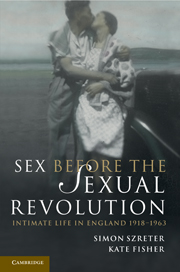Book contents
- Frontmatter
- Contents
- Acknowledgements
- 1 Introduction
- Part I What was sex?
- 2 The facts of life: learning about sex in childhood and youth
- 3 Sexual intimacies before marriage
- Part II What was love?
- Part III Exploring sex and love in marriage
- 10 Conclusion: private lives
- Appendix A The oral history sample: summary of project design and socio-demographic characteristics of the interviewees in Blackburn and north-west Hertfordshire
- Appendix B Note on social classification of the respondents
- Appendix C
- Bibliography
- Index
- Index of interviewees
3 - Sexual intimacies before marriage
Published online by Cambridge University Press: 05 June 2012
- Frontmatter
- Contents
- Acknowledgements
- 1 Introduction
- Part I What was sex?
- 2 The facts of life: learning about sex in childhood and youth
- 3 Sexual intimacies before marriage
- Part II What was love?
- Part III Exploring sex and love in marriage
- 10 Conclusion: private lives
- Appendix A The oral history sample: summary of project design and socio-demographic characteristics of the interviewees in Blackburn and north-west Hertfordshire
- Appendix B Note on social classification of the respondents
- Appendix C
- Bibliography
- Index
- Index of interviewees
Summary
daphne There wasn't the sex in those days; we were innocent … I mean to me … the morals have gone out of life nowadays … they're living together before they're married. They're sleeping together, they're carrying on and I don't approve of it … I mean we used to go in back row in pictures and (laughs) that kind of thing, you know … it was all so simple. We're very naïve I think really.
Some historians of twentieth-century sexuality, particularly those looking at American culture, have labelled the interwar era as a period of sexual revolution, and argue that the 1920s saw the emergence of an affluent and rebellious youth culture for whom premarital virginity was no longer a moral imperative. Social historians of Britain, by contrast, particularly those studying working-class communities, have found little evidence for a British version of such a sexual revolution. They, rather, argued that sex before marriage remained taboo despite the changing leisure opportunities, increased youth affluence and independence, and the emergence of new forms of recreational ‘dating’ in dance halls and cinemas that paralleled changes across the Atlantic. These interpretations often focus on women, who are presented as fearful of pregnancy and social stigma, and restricted by sexual ignorance and inhibitions: hence it is argued that they viewed premarital sex as a dangerous, rather than pleasurable, activity which ought to be avoided.
- Type
- Chapter
- Information
- Sex Before the Sexual RevolutionIntimate Life in England 1918–1963, pp. 113 - 162Publisher: Cambridge University PressPrint publication year: 2010



